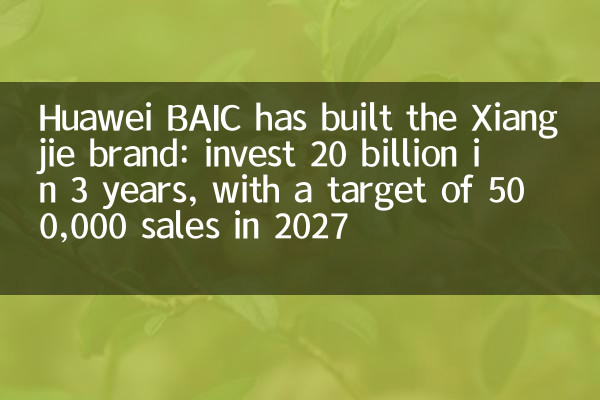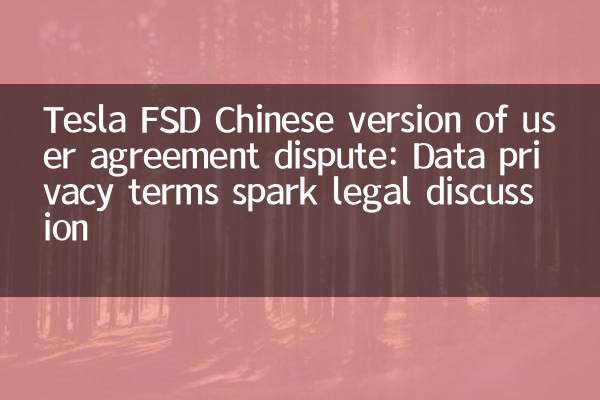Huawei BAIC has built the Xiangjie brand: invest 20 billion in 3 years, with a target of 500,000 sales in 2027
Recently, Huawei and BAIC Group jointly announced that the two parties will jointly create a new smart car brand "Xijie" and plan to invest 20 billion yuan in the next three years, with the goal of achieving annual sales of 500,000 vehicles by 2027. This news quickly became the focus of hot discussion across the Internet, marking the further acceleration of Huawei's layout in the field of smart cars.
1. Cooperation background and strategic goals

The cooperation between Huawei and BAIC began in 2021, and the two sides have had in-depth cooperation in the fields of smart car solutions, autonomous driving technology, etc. The "Xiangjie" brand launched this time is an upgraded version of the resource integration between the two parties, aiming to seize the high-end smart electric vehicle market. According to the plan, the Xiangjie brand will focus on models with a price range of 300,000 to 500,000 yuan, and directly benchmark against brands such as Tesla and NIO.
| project | data |
|---|---|
| Partners | Huawei + BAIC Group |
| Brand Name | Enjoy the world |
| Invest in funds | 20 billion yuan (within 3 years) |
| Target sales | 500,000 vehicles (2027) |
| Price range | 300,000-500,000 yuan |
2. Technology advantages and market competitiveness
Huawei's core technological advantages in the field of smart cars are the biggest highlight of this cooperation. The Xiangjie brand will be equipped with Huawei's self-developed Hongmeng car machine system, advanced autonomous driving solution (ADS 2.0) and "DriveONE" electric drive system. BAIC is responsible for vehicle manufacturing and supply chain management. This division of labor model is called an upgraded version of the "Huawei Inside" model in the industry.
| Technical field | Solutions provided by Huawei |
|---|---|
| Smart cockpit | Hongmeng Car Machine OS 4.0 |
| Autonomous driving | ADS 2.0 (supports L4 level) |
| Three-electric system | DriveONE 800V high voltage platform |
| Cloud Service | Huawei Cloud Intelligent Vehicle Control Platform |
III. Industry Analysis and Challenges
According to data from the China Passenger Car Association, the sales of new energy vehicles with a total of more than 300,000 yuan in China in 2023 was only 12%, but the growth rate was as high as 45%. Huawei BAIC chose this market segment, which not only avoided the fierce competition between the middle and low ends, but also faced the challenge of high-end brands. At present, this price range has been occupied by Tesla Model Y, NIO ET7 and other models.
| Competitive models | Sales in 2023 (10,000 vehicles) | Starting price (10,000 yuan) |
|---|---|---|
| Tesla Model Y | 45.6 | 36.4 |
| NIO ET7 | 8.2 | 42.8 |
| Ideal L9 | 12.1 | 45.98 |
4. Capacity layout and timetable
BAIC Group plans to renovate its Beijing production base specifically for the production of Xiangjie models. The first sedan will be released in the fourth quarter of 2024 and will be delivered in early 2025; the SUV model is expected to be launched by the end of 2025. By 2027, the annual production capacity is planned to reach 600,000 vehicles, covering China and some overseas markets.
| Time node | Key Events |
|---|---|
| Q4 2024 | The first sedan was released |
| Q1 2025 | First model delivered |
| Q4 2025 | SUV models are on the market |
| 2027 | Annual production capacity reaches 600,000 vehicles |
5. Expert views and industry impact
Zhang Xiang, an analyst in the automotive industry, said: "20 billion investment is equivalent to NIO's five years of R&D expenses, showing Huawei's determination. However, the goal of 500,000 vehicles is extremely challenging, requiring multiple breakthroughs in product strength, channel construction and brand premium." It is worth noting that this is the fourth brand Huawei cooperates with car companies. Previously, there have been Wenjie (Selis), Zhijie (Chery), and Aojie (JAC).
With the launch of the Xiangjie brand, Huawei’s smart car business’s “platform + ecology” strategy has become clearer. In the next three years, the competitive landscape of China's smart electric vehicle market may be reshaped by the collective efforts of Huawei brands.

check the details

check the details